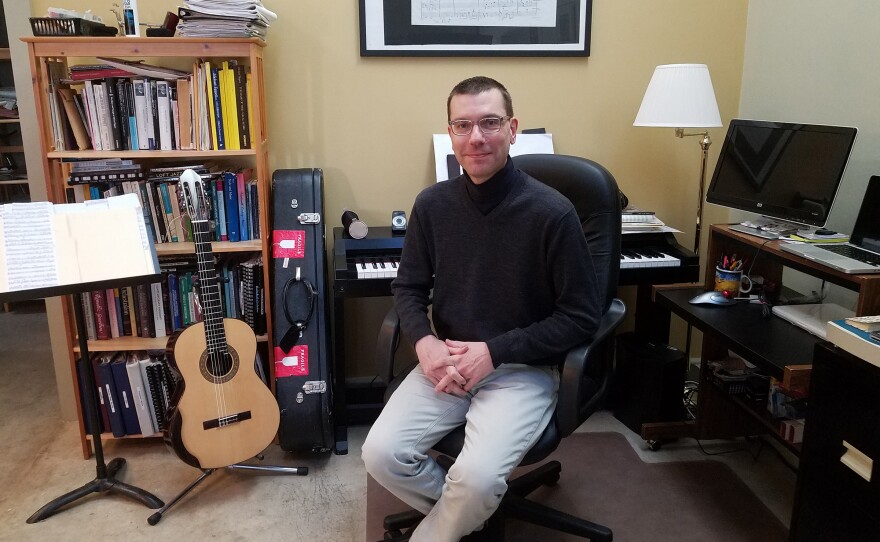Today, many composers don't perform on the instruments they write for -- they compose for other musicians. It wasn't that way centuries ago.
Think Bach or Brahms. They were best known as instrumentalists: Bach on the organ, Brahms on piano -- who also happened to compose.
Thomas Schuttenhelm, who lives in Hartford, is a sought-after composer and performer; that makes him something of a throwback. He also composes using a pencil and staff paper rather than a computer.
Schuttenhelm is a serious guitarist. He started playing as a young kid. His urge to compose began back then, too. He thinks growing up in what he described as a monotonous suburb of Albany had something to do with it.
"It wasn't an ideal place for me. So I would escape into my imagination, " Schuttenhelm said.
As a boy, he used that imagination on a small toy organ his parents bought for him. It came with a book of melodies.
"I went through the book," he said, "and played all the tunes and then started making up tunes, and I think that was the beginning of my using my creative instinct for music."
Schuttenhelm also has a love of literature, nurtured by a mother who owned a bookstore. So it's not uncommon for spoken words to be included in his compositions. Or even to be the inspiration for them. Schuttenhelm's piece based on the Walt Whitman poem, "A Clear Midnight," is for voice alone.
The idea for another piece came to Schuttenhelm after finding a letter written by T. S. Eliot. The 20th century poet was living in England, convalescing from a mental breakdown. In the letter, Eliot told a friend he wasn't able to write much poetry, so he was practicing scales on his mandolin.
Schuttenhelm hadn't known Eliot played, and got excited about sharing his discovery with a friend who's a professional mandolinist.
That friend is Mark Davis, the founding director of the New American Mandolin Ensemble.
Schuttenhelm knew Davis is also a long-time fan of T.S. Eliot and suggested to him, "wouldn't it be interesting if we could dream up a project together that combined Eliot's texts or thinking, since he was a mandolin player, with some original music?"
Around that time, there was a terrorist attack in London. Davis wanted the piece to be a creative response to violence around the world. He selected some of Eliot's poetry that evoked that theme. Like this verse from "The Wasteland":
What are the roots that clutch, what branches grow
Out of this stony rubbish?
Schuttenhelm set those and other words of Eliot's to music. And Davis gave the piece to his ensemble, which includes guitars, mandolins, and a bass.
Schuttenhelm's new piece, called "What the Thunder Said," premieres in England in May.
Davis's group performs only new music, but it's very rare for them to actually commission a piece. He says having Schuttenhelm write for his ensemble was a great honor.
“Not everybody can write well for the guitar. It's a real art, and it helps a great deal if you can play guitar well, yourself," Davis said.
Schuttenhelm is in high demand around the country. He's just finished a piece for a choir in Plattsburgh, New York, using Rilke's Sonnets to Orpheus. And the Chicago-based tenor, Justin Vickers, has commissioned Schuttenhelm to write a piece that evokes the time of Ovid. Vickers will sing and Schuttenhelm will play guitar. It's called "Apollo's Lament."
"I've tuned the guitar to that original ancient tuning. And there's a tiny little fragment of a hymn to Apollo, one of the oldest pieces, really oldest fragments of music. And I've used that melody in the piece, " Schuttenhelm said.
And if he ever faces a creative block, Schuttenhelm takes advantage of living in Hartford, where one of his favorite poets, Wallace Stevens, did his writing.
"I go to his house as a place to think, " he said.
In addition to Schuttenhelm's many composing projects, he's looking forward to a new role starting this fall. He's just been appointed artistic director of The Network for New Music, which draws on musicians from the Philadelphia Orchestra.
By then, he hopes, the piece he wrote based on T.S. Eliot, "What the Thunder Said," will have had its American premiere -- somewhere in southern New England.
Visit NEPR’s Spring Music Series for more stories.







